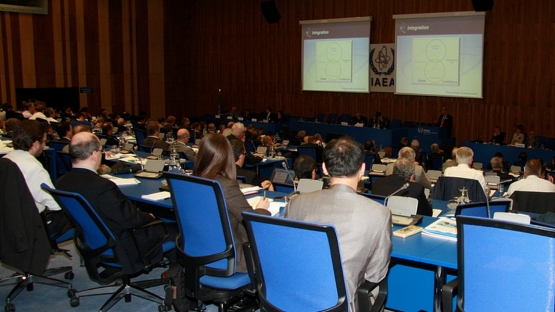Interested applicants have two weeks left to submit abstracts to the International Conference on Management of Spent Fuel from Nuclear Power Reactors, to be held at the IAEA in Vienna 15-19 June.
The conference will review best practices and recent developments in the management of spent fuel including storage, disposal and reprocessing, with a focus on technical and safety progress since 2010, when the previous IAEA conference was held on the subject. The accident at the Fukushima Daiichi nuclear power plant in Japan, which occurred a few months after the 2010 conference, prompted a greater focus on the safety of spent fuel management worldwide, leading to the introduction of new measures. "Much has changed in the world of spent fuel safety since the last conference in the wake of Fukushima," said Paul Standring, a nuclear engineer at the IAEA and the scientific secretary of the conference. "There will be a lot to compare notes on."
The purpose of the conference is to highlight the importance of an integrated long-term approach to the management of spent fuel from nuclear power reactors. The conference is aimed at a technical audience, including scientists, operators and regulators.
The conference provides decision makers and managers with a one-stop opportunity to find out about the latest developments in other countries, said Robert Einzinger, Senior Materials Engineer at the United States Nuclear Regulatory Commission, who attended the 2010 event. "This information is usually scattered in many conferences but this is the only meeting where it is all in one place," he said.
Keynote speakers will include senior representatives of the Organisation for Economic Co-operation and Development (OECD), the United States Department of Energy, the Swedish Nuclear Fuel and Waste Management Company (SKB) and the Korea Advanced Institute of Science and Technology (KAIST). Fiona Rayment, Director of Fuel Cycle Solutions at the UK’s National Nuclear Laboratory will chair the conference.
Around 10,000 tons of spent fuel is produced annually in nuclear power plants worldwide, and the first long-term disposal facility is expected to be operational only in the mid-2020s. In some countries, spent fuel disposal facilities may not be available for decades. Therefore, finding the best possible arrangement for fuel management in the interim period is of utmost importance, and the conference will address both the technical and safety aspects of temporary storage facilities and reprocessing. Engineers and policymakers will also discuss ways to plan ahead for the storage and management of future fuel types that may emerge.
The last conference attracted 250 participants from 46 countries. The deadline for attending the conference is 5 June. For more information, see the conference web site.
This information is usually scattered in many conferences but this is the only meeting where it is all in one place.


